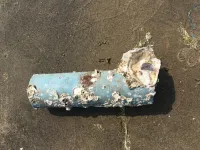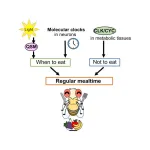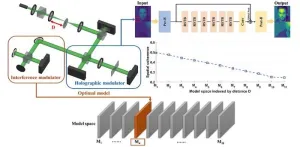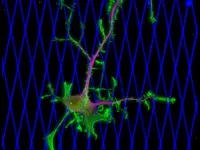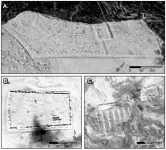(Press-News.org) A groundbreaking scientific study conducted along the Southeast coast of India has unearthed a pressing environmental concern -the increasing risk of invasive species colonization on marine debris. The research, published recently in Marine Pollution Bulletin, delves into the critical interplay between plastic pollution and the introduction of non-indigenous organisms into Indian waters.
In recent years, the surge in anthropogenic litter in the ocean has provided an extensive array of substrates for marine organisms to colonize. This accumulation of marine debris, especially near highly populated cities or tourist destinations, has inadvertently become a vector for the transport of fouling organisms, leading to far-reaching ecological and economic consequences.
To carry out the study, the research team, led by the Institut de Ciències del Mar (ICM-CSIC) and the Sathyabama Institute of Science and Technology in collaboration with the University of Barcelona (UB), the Abdelmalek Essaadi University (UAE) and the University of Oslo (UiO), embarked on a comprehensive examination of fouling organisms on various types of stranded litter, including plastic, glass, rubber, foam sponge, cloth, metal, and wood. Their meticulous efforts unfolded a startling reality: a total of 3,130 specimens/colonies belonging to seven phyla and representing 17 species.
Traveling on marine debris
The results unveil the presence of the invasive mussel Mytella strigata attached in high density groups to fishing nets. “This discovery emphasizes the significant role of marine litter in facilitating the spread of invasive species, potentially disrupting the ecological balance of Indian waters.” explains Dr. Gunasekaran Kannan, the first author of the study.
“Litter items with high buoyancy, such as bottles, buoys and plastic bags supported abundant macroinvertebrate assemblages, suggesting the potential for long distance transport.” continues Dr. Kannan.
Among the most commonly found organisms associated with marine litter were the cosmopolitan bryozoans Jellyella tuberculata and J. eburnea, the barnacles Lepas anserifera, Amphibalanus amphitrite, and Amphibalanus sp., and the oysters Saccostrea cucullata and Magallana bilineata.
Combating plastic pollution
This research is the first documentation of marine litter as a vector for species dispersal in India. “The results highlight the increasing risk of invasive species colonization on plastics along the southeast coast of India. This is particularly worrying at a time when plastics are becoming a more and more common substrate for marine organisms, especially in India, which is one of the top countries contributing most to ocean plastic pollution. Our study thus serves as a call to immediate action to address plastic pollution and its related threats in India.” explains Dr. Blanca Figuerola, a member of the Medrecover Group and the last author of the study.
“The dominance of plastic in the fouled marine litter is evident, representing 75.5% of the fouled litter items found.” notes Dr. Anna Sanchez-Vidal, associate professor in the UB Department of Earth and Ocean Dynamics, member of the UB's Marine Geosciences Consolidated Research Group and co-author of the study
“Effective waste prevention and management, education, and awareness campaigns are imperative to mitigate the introduction of invasive species via marine litter. Local and global stakeholders must come together to address this critical issue and protect the fragile marine ecosystems along India's southeast coast.”, adds Dr. Sanchez-Vidal.
The team already warned that plastic debris in the sea were contributing to the introduction and transport of non-native marine species in the Catalan coast in a recent study. Given this scenario, the experts decided to expand their research in other regions in collaboration with other universities and research centers, which has allowed them to publish this latest work. “This kind of studies are also effective for early detecting invasive species. However, prioritizing international cooperation to coordinate efforts aimed at reducing the proliferation of floating plastics is essential, ultimately curbing the risk of invasive species transportation between oceans.” concludes Dr. Figuerola.
END
Increasing risk of invasive species colonization on marine debris
A new ICM-CSIC study unveils that marine debris on India's southeast coast is increasingly facilitating the colonization of invasive species, posing a significant threat to the ecological balance of the region’s marine system.
2023-10-28
ELSE PRESS RELEASES FROM THIS DATE:
How do animals know it’s lunchtime?
2023-10-28
Tokyo, Japan – Researchers from Tokyo Metropolitan University have used fruit flies to study how daily eating patterns are regulated. They found that the quasimodo (qsm) gene helped sync feeding to light/dark cycles, but not in constant darkness: instead, the genes clock (clk) and cycle (cyc) keep eating/fasting cycles, while other “clocks” in nerve cells help sync it to days. Deciphering the molecular mechanism behind eating cycles helps us understand animal behavior, including our own.
Many members of the animal kingdom eat at roughly the same times each day. This is born out of the need to adapt to aspects of the environment, including ...
Interdisciplinary research team works to mitigate climate change effects in Texas Gulf Coast communities
2023-10-27
Experts in the Texas A&M University Department of Geography are teaming up with civil and chemical engineers and water resource, disaster recovery and public health researchers across the campus in a collaborative effort to better safeguard Texas Gulf Coast communities against climate-related emergencies, fueled by a three-year, $1.5 million grant from the National Academies Gulf Research Program (GRP).
The project, titled "Climate-LEAD: Climate Effects on Localized Environmental Health Disparities in Overburdened Texas Communities along Gulf Coast," is ...
An updated look at prostate cancer disparities
2023-10-27
Cedars-Sinai Cancer investigators have found that Black men respond as well as white men to systemic therapies for advanced prostate cancer when access to quality healthcare is equal, regardless of socioeconomic status. Their study, published today in the peer-reviewed Journal of Clinical Oncology, counters previous research suggesting that Black men receiving these therapies—which include hormone therapy, chemotherapy and immunotherapy—fare worse than white men do.
“We believe this is the most comprehensive look at this issue to date, and our findings suggest that, under the right conditions, Black men with metastatic ...
New battery technology could lead to safer, high-energy electric vehicles
2023-10-27
University of Maryland researchers studying how lithium batteries fail have developed a new technology that could enable next-generation electric vehicles (EVs) and other devices that are less prone to battery fires while increasing energy storage.
The innovative method, presented in a paper published Wednesday in the journal Nature, suppresses the growth of lithium dendrites—damaging branch-like structures that develop inside so-called all-solid-state lithium batteries, preventing firms from broadly commercializing the promising technology. But this new design for a battery “interlayer,” led by Department of Chemical and Biomolecular Engineering ...
Clear holographic imaging in turbulent environments
2023-10-27
Holographic imaging has always been challenged by unpredictable distortions in dynamic environments. Traditional deep learning methods often struggle to adapt to diverse scenes due to their reliance on specific data conditions.
To tackle this problem, researchers at Zhejiang University delved into the intersection of optics and deep learning, uncovering the key role of physical priors in ensuring the alignment of data and pre-trained models. They explored the impact of spatial coherence and turbulence on holographic ...
$76,000 in grants awarded to entrepreneurs addressing health disparities in local communities
2023-10-27
DALLAS, October 27, 2023 — Approximately 50 million people in the United States are at higher risk for heart disease and/or stroke because they lack the most basic needs — healthy food, clean air and drinking water, quality education, employment, housing and access to health care. Historically, people of color -- including Black and Hispanic/Latino people, are at even higher risk of cardiovascular disease (CVD) for these same reasons. Through the American Heart Association’s 2023 EmPOWERED to Serve Business Accelerator™, three local social entrepreneurs ...
Mechanics of breast cancer metastasis discovered, offering target for treatment
2023-10-27
UNIVERSITY PARK, Pa. — The most lethal feature of any cancer is metastasis, the spread of cancer cells throughout the body. New research led by Penn State reveals for the first time the mechanics behind how breast cancer cells may invade healthy tissues. The discovery, showing that a motor protein called dynein powers the movement of cancer cells in soft tissue models, offers new clinical targets against metastasis and has the potential to fundamentally change how cancer is treated.
“This discovery marks a paradigm shift in many ways,” said Erdem Tabdanov, assistant professor of pharmacology at Penn State and a lead co-corresponding author on the study, recently published ...
Cold War spy satellite imagery reveals Ancient Roman forts
2023-10-27
Two-thousand years ago, forts were constructed by the Roman Empire across the northern Fertile Crescent, spanning from what is now western Syria to northwestern Iraq.
In the 1920s, 116 forts were documented in the region by Father Antoine Poidebard, who conducted one of the world's first aerial surveys using a WWI-era biplane. Poidebard reported that the forts were constructed from north to south to establish an eastern boundary of the Roman Empire.
A new Dartmouth study analyzing declassified Cold War satellite ...
Call for Papers: JMIR Neurotechnology
2023-10-27
JMIR Neurotechnology, published by JMIR Publications, welcomes submissions from researchers, clinicians, caregivers, and technologists that explore novel diagnostic and treatment tools for neurological disorders, particularly those leveraging the potential of neurotechnology.
The scope of the journal includes but is not limited to:
Neuroradiology
Advancements in neurosurgery
Innovative diagnostic tools and techniques
Cutting-edge neurotechnology for therapeutics
Data sharing and open science in neurotechnology
Code ...
fMRI study finds correlated shifts in brain connectivity associated with overthinking in adolescents
2023-10-27
COLUMBUS, Ohio – A new study from The Ohio State University Wexner Medical Center and College of Medicine, University of Utah and University of Exeter (UK) substantiates previous groundbreaking research that rumination (overthinking) can be reduced through an intervention called Rumination-focused Cognitive Behavioral Therapy (RF-CBT). In addition, the use of fMRI technology allowed researchers to observe correlated shifts in the brain connectivity associated with overthinking.
Study findings are published online in the journal Biological Psychiatry Global Open Science.
“We know adolescent ...
LAST 30 PRESS RELEASES:
Personal perception of body movement changes when using robotic prosthetics
Study shows brain responses to wildlife images can forecast online engagement — and could help conservation messaging
Extreme heat and drought at flowering could put future wheat harvests at risk
Harlequin ichthyosis: a comprehensive review of pathogenesis, diagnosis, and management
Smithsonian planetary scientists discover recent tectonic activity on the Moon
Government censorship of Chinese chatbots
Incorporating a robotic leg into one’s body image
Brain imaging reveals how wildlife photos open donor wallets
Wiley to expand Advanced Portfolio
Invisible battery parts finally seen with pioneering technique
Tropical forests generate rainfall worth billions, study finds
A yeast enzyme helps human cells overcome mitochondrial defects
Bacteria frozen in ancient underground ice cave found to be resistant against 10 modern antibiotics
Rhododendron-derived drugs now made by bacteria
Admissions for child maltreatment decreased during first phase of COVID-19 pandemic, but ICU admissions increased later
Power in motion: transforming energy harvesting with gyroscopes
Ketamine high NOT related to treatment success for people with alcohol problems, study finds
1 in 6 Medicare beneficiaries depend on telehealth for key medical care
Maps can encourage home radon testing in the right settings
Exploring the link between hearing loss and cognitive decline
Machine learning tool can predict serious transplant complications months earlier
Prevalence of over-the-counter and prescription medication use in the US
US child mental health care need, unmet needs, and difficulty accessing services
Incidental rotator cuff abnormalities on magnetic resonance imaging
Sensing local fibers in pancreatic tumors, cancer cells ‘choose’ to either grow or tolerate treatment
Barriers to mental health care leave many children behind, new data cautions
Cancer and inflammation: immunologic interplay, translational advances, and clinical strategies
Bioactive polyphenolic compounds and in vitro anti-degenerative property-based pharmacological propensities of some promising germplasms of Amaranthus hypochondriacus L.
AI-powered companionship: PolyU interfaculty scholar harnesses music and empathetic speech in robots to combat loneliness
Antarctica sits above Earth’s strongest “gravity hole.” Now we know how it got that way
[Press-News.org] Increasing risk of invasive species colonization on marine debrisA new ICM-CSIC study unveils that marine debris on India's southeast coast is increasingly facilitating the colonization of invasive species, posing a significant threat to the ecological balance of the region’s marine system.
